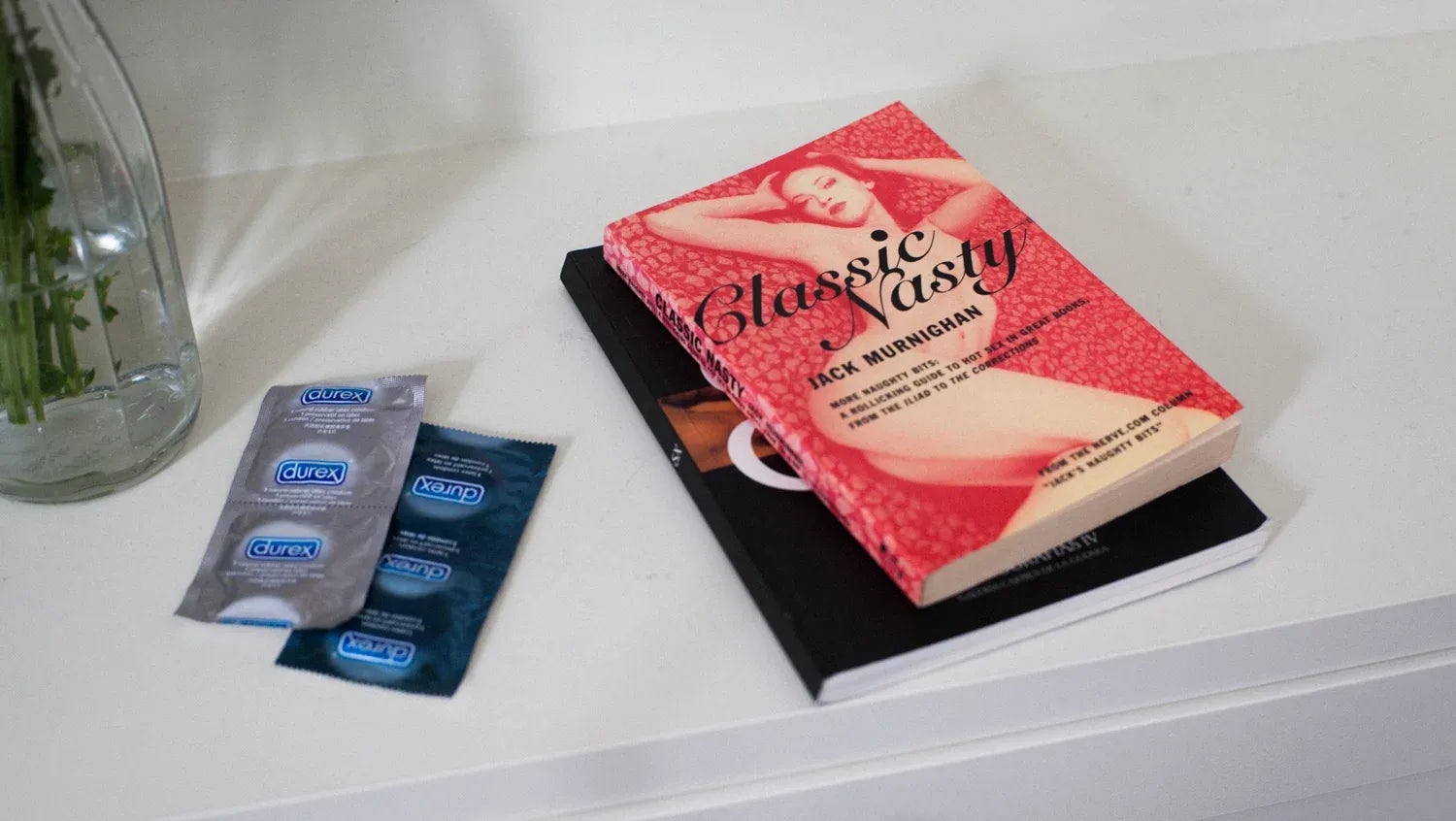
Condoms: An Ode To The Most Under-Appreciated Invention
Condoms: An Ode To The Most Under-Appreciated Invention
Condoms are one of the greatest, and also one of the most under-appreciated inventions, ever. The so called “rubber vulcanization process” was invented by Charles Goodyear in 1839, and patented in 1844. Condoms have been saving lives and making sex more safe and enjoyable for 175 years. And so far, nobody has come up with a better, cheaper, more accessible option for safer sex.
Despite their undeniable greatness, I hear a lot of complaints and criticisms about condoms, especially from penis owners. Oh, I'm sure you know the type…
“I don’t feel as much as I do during sex with a condom”, “they’re such mood killers” and so on…
So to everyone complaining about how condoms deprive them of their sexual pleasure, you know what else deprives us of our sexual pleasure? Fear of unwanted pregnancy, having to put crazy amounts of hormones into our bodies in the form of the contraceptive pill, STIs…
So, in aid of Condom Month this February, I'd like to talk about condoms, because they're great and there is so much to know about them in order to use and fully enjoy them. The right condom is an underestimated source of pleasure for all parts involved.
"Stealthing" refers to non-consensual condom removal and is the practice of a penis owner covertly removing or damaging a condom during sexual intercourse.
Before we get started, I'd like to make one thing very clear. Please repeat after me: Trying to trick someone into having sex without a condom is sexual assault.
"Stealthing" refers to non-consensual condom removal and is the practice of a penis owner covertly removing or damaging a condom during sexual intercourse, when their sex partner has only consented to condom-protected sex.
Purposefully removing or damaging a condom during sex is hugely dangerous as it opens both partners up to the risk of contracting an STI, it can lead to unwanted pregnancies and there is a huge violation of trust. Stealthing is a display of entitlement, power and control, the perpetrator violates the victim and asserts their power over their body. It is now finally widely considered sexual assault or rape and is a form of reproductive coercion because it turns a consensual sexual encounter (protected sex) into a nonconsensual one (unprotected sex).

Statistics About Condom Use...
It was not easy to find a valuable and recent, large-scale study about the use of condoms, so if somebody knows of a better one than this – please send it my way! I would love to read it. I found a study conducted between September 2011 and September 2015 (Copen, 2017). The researchers questioned 11,300 women and more than 9,300 men about their behaviours concerning the use of condoms. They found that:
– About 24 percent of women and 34 percent of men used a condom during their last sexual intercourse.
– Among those who used condoms, nearly 60 percent of women and 56 percent of men said condoms were the only means of contraception used in the past year.
– Another 25 percent of women and 33 percent of men used condoms plus hormonal methods such as birth control pills or implants.
– 15 percent of women and 10.5 percent of men used condoms plus non-hormonal contraception.
– Copen also found that during past month intercourse, 18 percent of women and nearly 24 percent of men used a condom every time.
– Nearly 7 percent of women who used a condom in the past month said the condom broke or fell off during intercourse or withdrawal. Nearly 26 percent said they used a condom only part of the time during intercourse.
I could not find any study of how many people have been pressured into unprotected sex by their partner. To me, this indicates once again how little our law and research reflects the understanding of consent. These statistics show that there is obviously still a need for more education about condoms. Especially the relatively high frequency of condoms that break or fall off suggests that many people don’t use condoms correctly.
Benefits of Condom Use...
– Condoms are relatively affordable and accessible.
– Condoms are the only form of birth control that protects against STIs and HIV.
I personally am not a fan of sex education that focuses on spreading fear of STIs and we should never be shaming people who have one. In fact, it is very likely that you’ll have one at some point throughout your adult life. But I do believe that we should be informed about them and be able to speak openly about them so we can protect ourselves. So even if you are taking other contraceptives, using a condom just adds another layer of protection.
– There are usually no side effects, unlike with other birth control methods.
When people say “but why don’t you just take the pill? I really have to contain myself not to be rude sometimes. For decades we’ve been fed the belief that the contraceptive pill is magic – it makes our skin better, our boobs bigger… oh and it can also cause depression, severe lack of libido, increased cancer risk… should I continue? I really wish young girls were better educated before they start putting hormones into their bodies for years and years without being fully aware of the consequences. Condoms are a safe way to avoid hormonal contraception methods.
– Condoms can be fun. They come in various materials, shapes, flavours and styles that can increase pleasure for you and your partner.
Have you experienced issues with condoms? They don’t fit well? Find them itchy? Well, keep reading. Maybe you are not using the right one for you.
Your Condom Options…
Size:
Every person and their penis are different and so are condoms. To enjoy the use of them and to ensure safety during sex it is very important that you find the right size for you. If you often have issues with condoms breaking or falling of, it is very likely that you are using a wrong size. Before you decide upon what condom size you need, you must measure your erect penis size, both length and girth. Use that measurement as a guide, selecting condoms that have similar measurements. Sizes can vary from brand to brand, there is no absolute rule for who should use which condom sizes, but the following guidelines, which are in inches, may help taken from bedible
A girth of less than 4.7″ needs a snug fit
A girth of 4.7–5.1″ needs a regular fit
A girth of 5.1–6″ needs a large fit
Thickness:
If you’ve bought and used condoms before, you probably know that there are differences in thickness. Sometimes brands advertise with “ultra-thin” condoms for more sensation. While you’d assume that the thinner a condom is, the more sensation you would feel, there is actually little hard evidence to support this. But just give it a try! If you have more comfortable sex with ultra thin condoms, who are scientists to tell you what you feel?
PS: Extra Thick does not mean extra safe!!
Material:
The material of the condom matters a great deal. If you have experienced unpleasant itching or pain while using a condom you might be allergic to latex, which is the most commonly used material for condoms. But, don’t stress! There are other non-latex alternatives out there that you can try, like polyurethane, and lambskin. Remember that Latex condoms should not be used with oil-based lubricant because it can break down latex.
– Polyurethane is a plastic material used in many contexts, from insulation to furniture and condoms. Polyurethane condoms are usually thinner than latex condoms, and they are better at transferring heat. Polyurethane condoms provide effective barriers against HIV and bacterial STIs. However, polyurethane is less flexible than latex, which makes them slightly more fragile than latex condoms.
– Polyisoprene is very similar to latex, but it lacks the proteins that can sometimes cause allergic reactions. These condoms are slightly thicker than polyurethane, but they are softer and feel more natural than latex.
– Lambskin condoms do not contain lamb’s skin, but are still not for people who want to avoid using animal products. They contain lamb cecum, a part of the intestine. The cecum is thin, durable, and good at transferring heat. Unfortunately, lambskin condoms may not protect against STIs or HIV.
Detail info taken from bedible
Other Extras:
– Flavoured condoms can enhance oral sex.
– Lube can make a big difference. Some condoms are enhanced with desensitising lube for longer sex, for example.
– They can be ribbed for more pleasure
– There are even condoms that Glow-in-the-Dark. The list of fun extras is endless.
My Rubber Recommendations...
If you haven't tried HANX yet it's time to get to know. Designed to be as considerate as your skincare favourites, HANX ultra-thin, Fair Rubber latex condoms are vegan and free from unnecessary chemicals and harsh spermicides. Made from 100% Fair Rubber latex and available in Standard and Large Size, their chic, gynae-backed condoms are the perfect fit for your bedtime table and they're biodegradable, too!

GET A FREE MOVIE






























